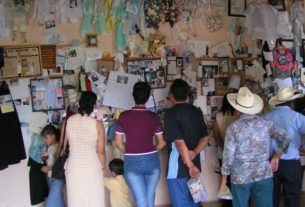Those who characterize liberals as wimps or ineffective bleeding hearts would think twice if they lived in the era of a fiery and committed jurist and reformer named Santos Degollado. Along with the politician-scientist Melchor Ocampo and the poet-journalist Guillermo Prieto, Degollado was one of the bright young men in the inner circle of Progressives and intellectuals who rallied to the standard of Benito Juárez.
There was a tradition of political activism in the Degollado family and this activism was directly responsible for the fact that the boy grew up in poverty. He was born in the city of Guanajuato, capital of the similarly named state, and his parents, Francisco and Mariana, had been partisans of the independence movement. This sympathy led to their property and goods being confiscated by the Spanish colonial authorities. Both parents died while Santos was young and he was taken by an uncle to live in Mexico City. There he studied at the Military College, Mexico’s West Point, and this training stood him in good stead when the bitter Reform War broke out.
In 1828 he came to Morelia and worked as a scribe for a notary named Valdovinos. Degollado performed similar duties at the Cathedral — somewhat ironic for one who would later gain fame as a leading figure in the anticlerical movement whose goal was to clip the Church’s wings.
As a scribe, Degollado acquired a wide range of learning and emulated such friends and contemporaries as Melchor Ocampo by steeping himself in the works of Voltaire, Monresquieu and other 18th century French philosophers. He also found time to put his military knowledge to use, serving against the adventurer and sometime dictator Santa Anna and rising from private soldier to general.
Degollado’s friend Melchor Ocampo had become governor of Michoacan and under him Degollado held a number of posts. These included secretary of education and board chairman of a group that trained artisans and promoted arts and crafts. Degollado also taught law at the University of Morelia. He served as a federal deputy for Michoacán in 1856-57 and on July 1, 1857, was elected state governor.
But he didn’t hold office for long. In February 1857 a new, liberal Constitution had been adopted. It promoted civil liberties but was particularly aimed at the power of the Church, establishing secular education, giving priests and nuns the liberty to renounce their vows and forbidding the Church to own land. In a furious statement from the Vatican, Pope Pius IX excoriated these laws as a “detestable pest” and threatened any Catholic who signed them with excommunication.
In Mexico, pro-clerical conservatives resorted to more than words. General Félix Zuloaga, a former gambling house card sharp, locked up Benito Juárez, then serving as vice-president, and forced President Ignacio Comonfort to repudiate the Constitution. But Comonfort changed his mind and released Juárez, who promptly fled to Querétaro to set up a rival government. In the meantime, Zuloaga declared himself president in Mexico City. This was the background to the bloody, fratricidal Reform War of 1857-60.
At the beginning, the conservatives swept everything before them. They were supported by most of the army and had by far the better generals. When they captured Morelia, Degollado was forced to flee. He joined Juárez’s government-in-exile and on March 27, 1858, Juárez awarded him the rank of general and made him minister of war and marine.
The tide eventually turned against the conservatives because Juárez doggedly held on to Veracruz during the entire conflict. Controlling the customs, he was able to generate revenue and cause a crossover of skilled mercenaries from the conservative to the liberal side. But the first liberal victory in a pitched battle didn’t take place until September 1860, when a juarista army of 7,000 triumphed over a rightist force of 3,000 under the brilliant young General Miramón. As for Degollado, it should be borne in mind that he was a citizen-soldier going up against the ablest professionals. But this didn’t daunt his fiery spirit. Defeated at Atentique, Guadalajara, Cuevas de Techaluta and Tacubaya, Degollado launched a daring raid on Mexico City and succeeded in capturing Chapultepec Castle. Then he made the mistake of waiting for a popular uprising within the city — one that never came. Instead, the ablest of the conservative generals, Leonardo Márquez, mounted a counteratttack and drove Degollado out of the city.
In the end, persistence paid off. By teaming up with General Jesús González Ortega, who became known as “the general of victories,” and by raising fresh levies of tough fighting men from northern Mexico, Degollado played a key role in ensuring the liberals, final victory. In recognition of his services, González Ortega placed Degollado at the head of the victory parade to celebrate the liberals’ capture of Mexico City.
Victory was followed by tragedy. Degollado’s great friend Melchor Ocampo, believing Juárez was being too lenient toward the defeated rightists, angrily resigned from the government and returned to his hacienda in Michoacán. There the defenseless man was seized by General Márquez and shot. In a rage over the death of his closest companion, Degollado mounted a punitive expedition against the brutal Márquez, who had previously ordered that all medical personnel serving with the liberals be executed. The hunter turned out to be the hunted. On June 15, 1861, Degollado’s force was ambushed by Márquez. Taken prisoner, Degollado suffered the same fate as his great friend.
Buried at Huixquilucan, in the state of Mexico, Degollado’s remains were dug up July 5, 1862, and moved to a place of honor in Mexico City. The fighting liberal also left behind a cultural monument: Guadalajara’s famous Degollado Theater. It was built on his initiative and Degollado laid the cornerstone on March 5, 1856. Inauguration came ten years later, five after Degollado’s death, when the celebrated Mexican soprano played the lead in Donizetti’s Lucia de Lammermoor.
30-Jul-00


